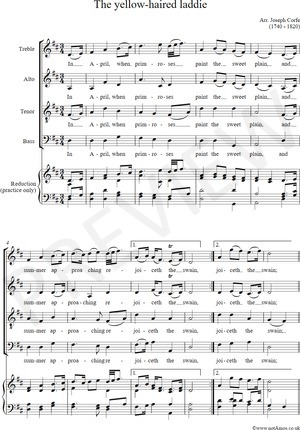 notAmos Performing Editions 1 Lansdown Place East, Bath BA1 5ET, UK +44 (0) 1225 316145 Performing editions of pre‑classical music with full preview/playback and instant download |
Joseph Corfe (arr.)
(1740 - 1820)
The Yellow Hair'd Laddie
(S.A.T.B. + reduction)
Full score (PDF), €0.20 for a single copy Buy this item(1740 - 1820)
The Yellow Hair'd Laddie
(S.A.T.B. + reduction)
Choir offer (PDF), €1.00 for 12 copies Buy this item
Printable cover page (PDF), €0.00 for unlimited copies Download this item
If you have any problem obtaining a PDF, please see our help page. If that does not resolve the issue, please click here.
For licensing/copyright information please click here
Corfe, organist of Salisbury Cathedral, 1792 - 1804, issued two sets of "Twelve glees.... composed from ancient Scotch melodies" in the early 1790s, to satisfy two contemporary enthusiasms: that for mixed sex social music, and that for all things North-British. The current arrangement comes from the first set.
These glees were selected from a repertoire of well-known Scottish songs that had been anthologised in the previous seventy years. Corfe appears to have been particularly indebted for source material to James Johnson's "Scots Musical Museum", Edinburgh 1787, which included texts edited and improved by Robert Burns. Verses that are not underlaid were not included by Corfe, and have been imported from external sources (most especially the aforementioned "Scots Musical Museum").
These glees were selected from a repertoire of well-known Scottish songs that had been anthologised in the previous seventy years. Corfe appears to have been particularly indebted for source material to James Johnson's "Scots Musical Museum", Edinburgh 1787, which included texts edited and improved by Robert Burns. Verses that are not underlaid were not included by Corfe, and have been imported from external sources (most especially the aforementioned "Scots Musical Museum").
Lyrics: Anon
In April, when primroses paint the sweet plain,
And summer approaching rejoiceth the swain,
The yellow-haired laddie would oftentimes go
To wild and deep glens, where the hawthorn trees grow.
There, under the shade of an old sacred thorn,
With freedom he sung his loves evening and morn;
He sung with so fast and enchanting a sound
That silvans and fairies unseen danced around.
The shepherd thus sang: Though young Mary be fair
Her beauty is dashed with a scornful proud air;
But Susie was handsome, and sweetly could sing,
Her breath like the breezes perfumed in the spring.
That Maddie, in all the gay bloom of her youth,
Like the moon was inconstant, and never spoke truth;
But Susie was faithful, good-humoured and free,
And fair as the goddess who sprung from the sea.
That mamma's fine daughter, with all her great dower,
Was awkwardly airy and frequently sour;
Then sighing he wishes, would parents agree,
That witty sweet Susie his mistress might be.
In April, when primroses paint the sweet plain,
And summer approaching rejoiceth the swain,
The yellow-haired laddie would oftentimes go
To wild and deep glens, where the hawthorn trees grow.
There, under the shade of an old sacred thorn,
With freedom he sung his loves evening and morn;
He sung with so fast and enchanting a sound
That silvans and fairies unseen danced around.
The shepherd thus sang: Though young Mary be fair
Her beauty is dashed with a scornful proud air;
But Susie was handsome, and sweetly could sing,
Her breath like the breezes perfumed in the spring.
That Maddie, in all the gay bloom of her youth,
Like the moon was inconstant, and never spoke truth;
But Susie was faithful, good-humoured and free,
And fair as the goddess who sprung from the sea.
That mamma's fine daughter, with all her great dower,
Was awkwardly airy and frequently sour;
Then sighing he wishes, would parents agree,
That witty sweet Susie his mistress might be.
